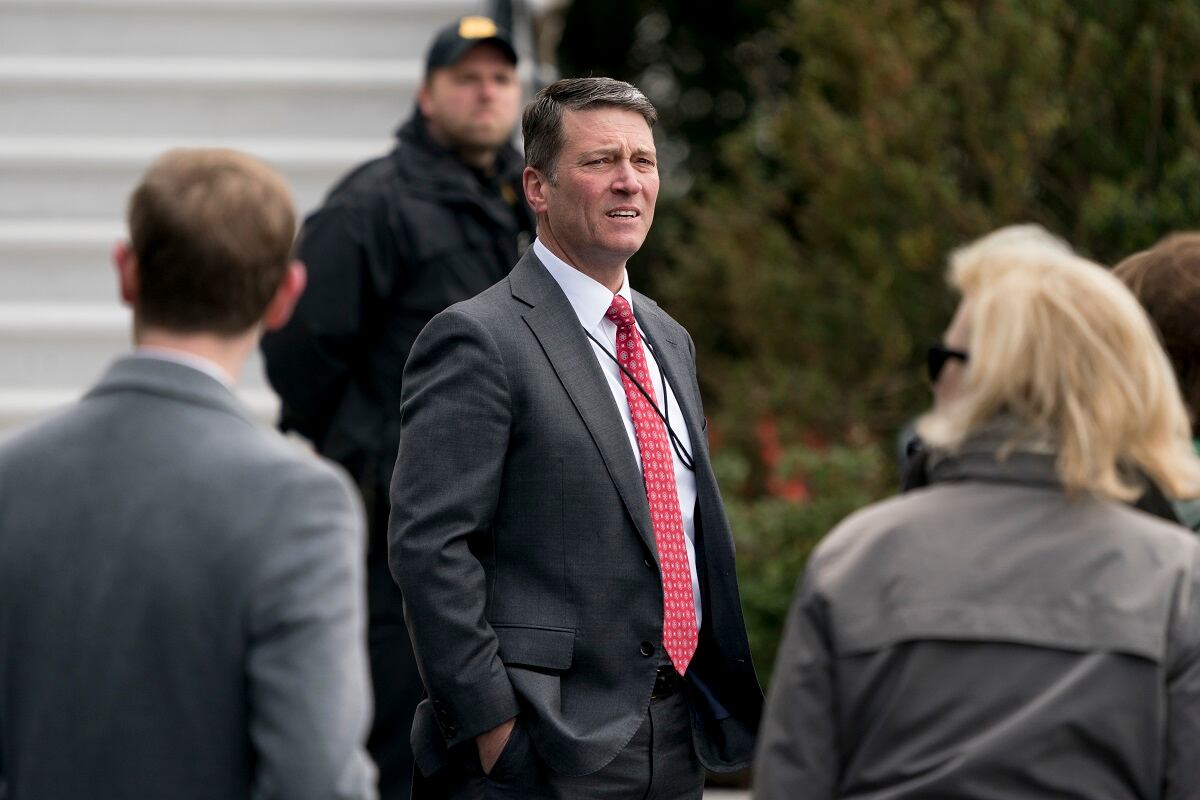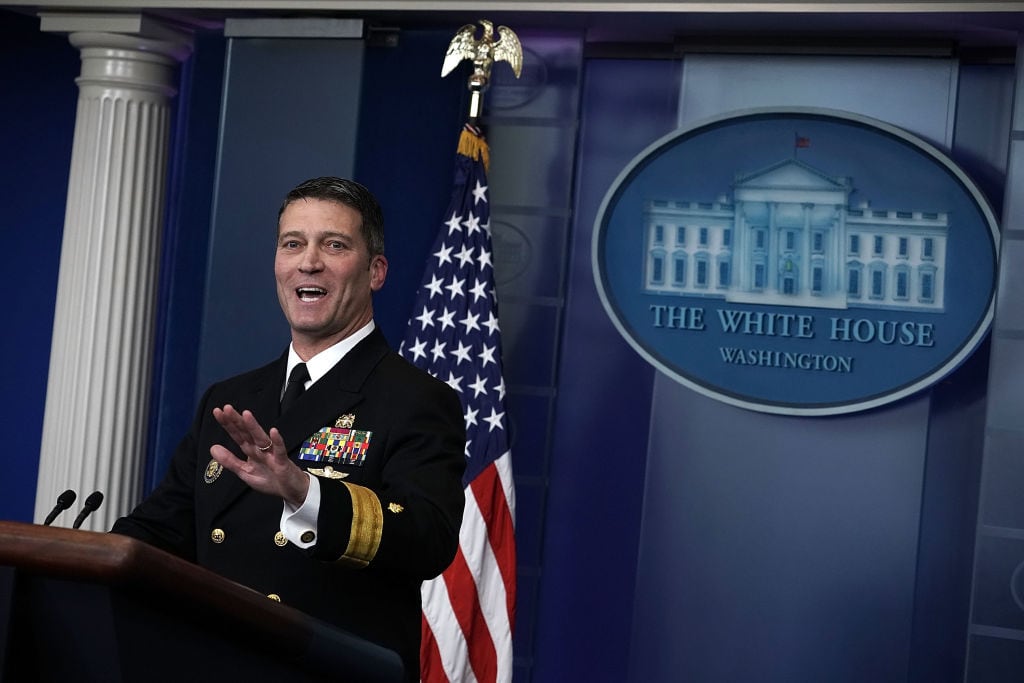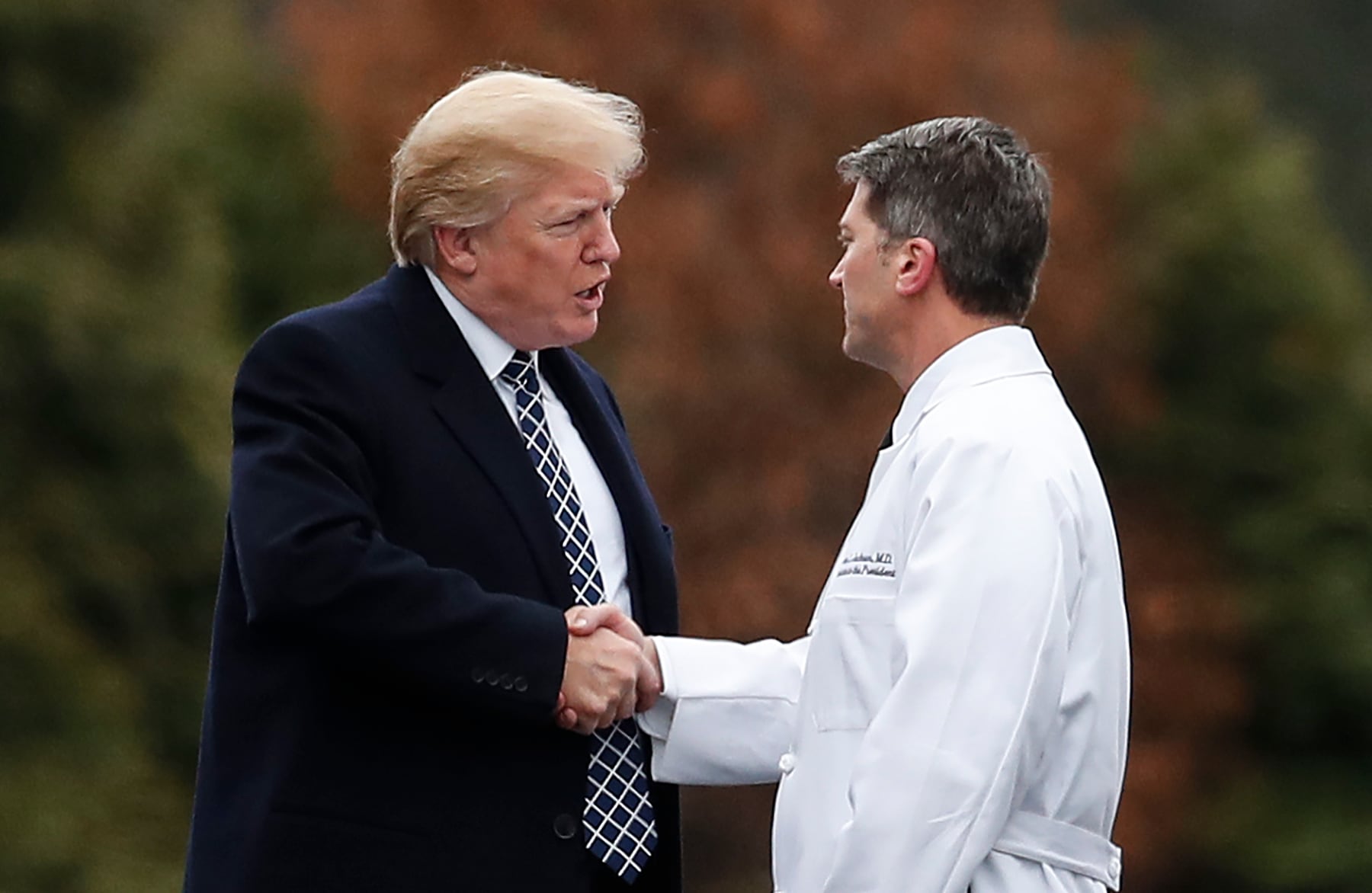WASHINGTON — His nomination in peril, Veterans Affairs nominee Ronny Jackson fought Tuesday to convince lawmakers of his leadership abilities as more details emerged over his alleged misconduct, ranging from repeated drunkenness to a toxic work environment, as he served as a top White House doctor.
President Donald Trump sent mixed signals about his choice to lead the sprawling veterans’ agency, suggesting during a White House news conference that Jackson may want to withdraw because of unfair scrutiny. But the president privately urged his nominee to keep fighting to win Senate confirmation, and Jackson showed few signs of backing down.
A watchdog report requested in 2012 and reviewed by The Associated Press found that Jackson and a rival physician exhibited “unprofessional behaviors” as they engaged in a power struggle over the White House medical unit. The six-page report by the Navy’s Medical Inspector General found a lack of trust in the leadership and low morale among staff members, who described the working environment as “being caught between parents going through a bitter divorce.”
“There is a severe and pervasive lack of trust in the leadership that has deteriorated to the point that staff walk on ‘eggshells,‘” the assessment found.
The inspector general report reviewed by The AP included no references to improper prescribing of drugs or the use of alcohol, separate allegations revealed by a Senate committee.
The audit appeared to contradict public statements from Jackson, who declined Tuesday to answer reporters’ questions about the allegations. He gave no indication he would withdraw and denied the existence of any inspector general report detailing troubling behavior.
After the Senate Veterans Affairs Committee abruptly postponed his confirmation hearing, which had been set for Wednesday, Jackson visited lawmakers to assure them he was fit to lead the VA.
“I’m looking forward to getting it rescheduled and answering everybody’s questions,” he said in video captured by MSNBC, referring to his hearing.
During a White House news conference, Trump insisted he would stand behind Jackson, calling the White House doctor “one of the finest people that I have met.” But he questioned why Jackson would want to put himself through the confirmation fight, which he characterized as unfair.
“I wouldn’t do it,” Trump said in the East Room, standing next to French President Emmanuel Macron.
“What does he need it for? What do you need this for? To be abused by a bunch of politicians that aren’t thinking nicely about our country?” Trump asked.
RELATED

Trump said Jackson, who has been a White House physician since 2006, would make a decision soon. Jackson met privately with Trump Tuesday afternoon in the Oval Office and the president urged him to keep fighting to win confirmation, according to a White House official briefed on the meeting. The official, who spoke on condition of anonymity to describe internal discussions, said Jackson denied the allegations.
Digging in, the White House released handwritten reports from Trump and former President Barack Obama praising Jackson’s leadership and medical care, and recommending him for promotion.
Obama wrote in one report, “Promote to Rear Admiral now.” Trump wrote last year that Jackson is “A GREAT DOCTOR + LEADER - ‘2 STAR MATERIAL.’”

The White House also disputed allegations that Jackson improperly administered medication, saying the medical unit passed regular audits by the Controlled Substance Inventory Board.
A doomed VA nomination would be a political blow to the White House, which has faced criticism for sloppy vetting of Cabinet nominees and tough confirmation battles in a Senate where Republicans hold a slim 51-49 majority.
Prior to Jackson’s nomination, Trump had told aides and outside advisers that he was fond of Jackson personally and was said to be particularly impressed with Jackson’s performance at the White House press room podium in January, when he offered a glowing report on the president’s physical and mental well-being.
Senate Minority Leader Chuck Schumer, D-N.Y., said the American people were the losers in a shaky nomination effort. The Trump Cabinet, he said, “is turning into a sad game of musical chairs.”
Trump tapped Jackson last month after firing former Obama administration official David Shulkin following an ethics scandal and mounting rebellion within the agency. But Jackson has faced numerous questions from Republican and Democratic lawmakers, as well as veterans groups, about whether he has the experience to manage the massive department of 360,000 employees serving 9 million veterans.
RELATED

Allegations began surfacing late last week involving Jackson’s workplace practices, including claims of inappropriate behavior and over-prescribing prescription drugs, according to two aides granted anonymity to discuss the situation. The complaints the White House heard include that he oversaw a poor work environment and that he had drunk alcohol on the job, according to an administration official who demanded anonymity to speak on a sensitive personnel matter.
The Senate Veterans Affairs Committee said it would postpone indefinitely Jackson’s hearing to give it more time to sort through the allegations.
Detailing the allegations to NPR, Sen. Jon Tester of Montana, the committee’s top Democrat, said more than 20 current and retired military personnel had made complaints to the committee about Jackson. They included claims that Jackson was “repeatedly drunk” while on travel with Obama and that on overseas trips he excessively handed out prescription drugs to help travelers sleep and wake up.
Tester later told CNN that Jackson was known inside the White House as “the candy man,” because he would hand out prescription drugs “like candy.”
Jackson is also accused of creating a “toxic work environment,” Tester said on NPR.
“He is the physician for the president, and in the previous administration we were told the stories he was repeatedly drunk while on duty, where his main job was to take care of the most powerful man in the world. That’s not acceptable,” Tester said.
Asked if Jackson’s nomination is still viable, the committee chairman, Sen. Johnny Isakson, R-Ga., responded, “We’ll see.”
The two lawmakers sent a letter to Trump on Tuesday requesting additional information about Jackson. It demands any communication between the Pentagon and the White House for the last 12 years regarding “allegations or incidents” involving him.
The 2012 assessment reviewed by the AP suggested the White House consider replacing Jackson or Dr. Jeffrey Kuhlman — or both. Kuhlman was the physician to Obama at the time, and had previously held the role occupied by Jackson: director of the White House medical unit.
According to the report, Jackson admitted he had failed to shield the White House medical unit from the leadership drama. He is quoted saying he was willing to do what was necessary to straighten out the command, even if it “meant finding a new position in Navy Medicine.”
The report stated that the “vast majority” of those interviewed said Kuhlman had “irrevocably damaged his ability to effectively lead.” It added that “many also believe that CAPT Jackson has exhibited poor leadership,” but attributed those failures to the relationship with Kuhlman.
The report quoted unnamed members of the White House medical unit who, while participating in a focus group, used phrases like “Worst command ever,” ″No one trusts anyone” and “The leaders are child-like.” Jackson was named physician to the President in 2013, after Kuhlman left the unit entirely.
Still, a follow-up assessment was done in 2013, and found that the climate in the office had improved a great deal, according to an official familiar with the report. At that point, Jackson was still in the office, but Kuhlman had left.
Associated Press writers Lisa Mascaro, Catherine Lucey, Lolita Baldor, Alan Fram and Matthew Daly contributed to this report.




